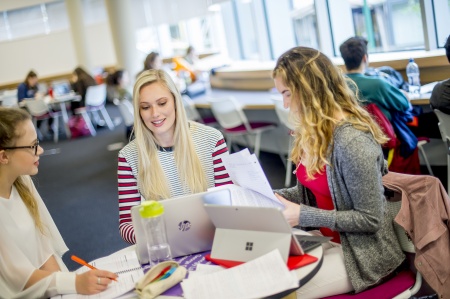
January 24, 2022, by Emma
January assessments – support from Libraries
Libraries are here to help you prepare for your assessments.
Not sure where to start? Read on for more information about how we can help, top tips for studying effectively and links to some useful resources from across the university.
1. Get support for your studies
Libraries offer a range of services to support students with their academic learning, including our helpline, useful online resources and weekly webinars.
– If you need help with using our libraries or accessing resources, Library staff will be happy to help. Pop in to any of our libraries and ask any member of staff wearing a blue lanyard for help. Staff are available until 9.45pm Monday to Friday and until 5pm at the weekend. You can also contact us by email, phone or live chat.
– Join our regular Ask Libraries webinars for an introduction to our library services and how to find resources.
– If you are looking for help with your academic skills, our Student Academic Skills team offer a selection of useful subject-specific resources on topics such as revision, academic writing, criticality, time management, motivation and a lot more. You can access these on the Student Academic Skills Moodle Hub for your faculty. The team also run weekly webinars including group sessions, one-to-ones and our Study With Us online study session.

2. Find the right study space for you
Our libraries offer a range of bookable and drop-in study spaces from individual desks and PCs to bookable rooms and group spaces.
Here are our top tips for finding the right study space for you:
– If you want to be sure of a study space in our libraries or have a favourite spot, you can book in advance online using Click and Study. When booking, you can choose your preferred library and type of space – individual, silent, group, calm, postgraduate etc. You can even book spaces with a power point or height adjustable desk.
– Dedicated study spaces are available in our libraries for students referred to us by Disability Support Services.
– If our libraries are busy, there are several alternative spaces available, including the Exchange on Jubilee Campus, The Barn’s Dining Hall on Sutton Bonington and Monica Partridge Building on University Park.
You will need your University Card for access to our libraries and to borrow books and print. However, following student feedback, we are trialling a new way of providing access to the library for students who either don’t have or have forgotten their card.
Please continue to follow Covid-19 guidance when using University spaces, including wearing face coverings in indoor areas. For the latest updates on regulations on campus, visit Safety on Campus.

3. Take a break.
Make sure you take regular breaks when studying. Studying is tiring and taking breaks will help you with your concentration. We recommend using the Pomodoro technique which breaks down your study time into manageable chunks of 25 minutes. We use this technique in our weekly virtual study session, Study With Us.
If you are in one of our libraries and would like to take a break, why not visit one of our campus cafes or go for a walk. You could also have a healthy snack, talk to your friends, or read something you enjoy. Three of our libraries have a leisure reading collection available for you to browse.
If you need any support or are worried about your wellbeing or a friend, the university provides a range of support services. Please do not be afraid to ask for help.

4. Finding print and online resources
Your libraries offer an extensive collection of print and online materials for your studies, including journals, ebooks, video and more.
You can search for print and online resources on the university’s library discovery tool, NUsearch. Looking for your reading list? Find it on the Moodle pages for your module or on our reading list site.
Not sure where to start? Browse our guides to:
– subject guides – find the key resources for your subject
– borrowing from our libraries
If you’re studying at home or elsewhere off-campus, try the Library Access browser extension for easy access to online resources off-campus. Just follow the instructions and you are ready to go. The extension is available for most browsers, including Safari, Opera, Firefox, and others.
If you are still struggling or have any questions, ask a member of Library staff, or join one of our Ask Libraries webinars. Visit one of our libraries where Library staff will be happy to help.

5. Join a bitesize exam skills webinar
Our Student Academic Skills team support students across all levels and in all subjects to develop skills that boost their academic confidence.
Our live Study Chat webinars introduce a range of academic skill strategies and tools, to help you to study smarter. This includes support with your exams. Our bitesize webinars in January include sessions on ‘Answering the exam question’, ‘Critical thinking and argument for your exams’ and ‘Planning time for open books exams’, amongst others.
6. Preparing your notes, planning your writing and proofreading

Perhaps you are preparing your notes ahead of an open book exam or maybe you are planning your writing for an assignment? Here’s some top tips and useful resources.
– How you like to make notes is personal, but you can find some strategies and examples of other students’ work in our Student Academic Skills Notemaking toolkit. Have a look through and see what appeals to you.
– If you feel you have a lot of work to do, it helps to set yourself manageable goals. Using SMART goals may be one way to break down larger pieces of work, or exam preparation, into smaller chunks.
– When writing an assignment, essay, or dissertation, it is useful to plan the structure of your writing. You can do this by using your word count to help you think about how your words are distributed.
– Once you are writing, you need to use sources to support your writing and to build your argument. Knowing the difference between quoting, paraphrasing, and summarising will help you to do this.
– You should ensure that your reader can easily find their way through your writing. We suggest making use of signposts, to create well-structured writing that flows in a logical order.
– There are a number of tools and strategies that can help you with proofreading, including Grammarly and aural proofreading.
You can find more information on preparing for your assessment on our Library Matters blog.
7. Referencing
 Correct referencing is important to acknowledge the work of others and avoid plagiarism. Multiple approaches to referencing are in use across the university. Please check with your School or Department that you are using the correct style for your assessments.
Correct referencing is important to acknowledge the work of others and avoid plagiarism. Multiple approaches to referencing are in use across the university. Please check with your School or Department that you are using the correct style for your assessments.
– Cite Them Right is a handy guide to referencing which is available in print and ebook format via NUsearch.
– You can manage your references by using EndNote. There are a number of how-to guides available for you to have a look at.
– Did you know you can test your text for plagiarism before submitting it? Simply use the Test your Text service in Moodle. Click ‘Participate in Module’ and follow the instructions to upload and test your text, to make sure it follows the rules set out by your lecturer.
Good luck with your exams and assessments! Don’t forget, if you have any questions about our library services, or need support with your academic skills, we can help.
- Contact the Library Helpline
- Join the Student Academic Skills Hub for your Faculty
- Browse upcoming webinars
No comments yet, fill out a comment to be the first

Leave a Reply